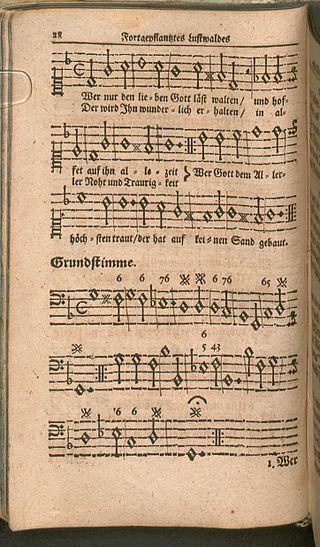
"Wer nur den lieben Gott läßt walten" is a 1641 hymn by Georg Neumark, who also composed the melody for it. It has seven verses and deals with the Christian putting their trust in God. Its author referred to it as a "Trostlied" or song of consolation and it first appeared in his Fortgepflantzer musikalisch-poetischer Lustwald. It also appeared in Johann Crüger's 1672 Praxis pietatis melica and in the first part of Johann Anastasius Freylinghausen's 1704 Geistreiches Gesangbuch. It has inspired musical settings, and is part of current German hymnals, both Protestant and Catholic.
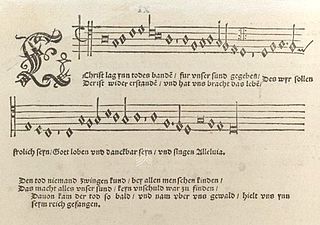
"Christ lag in Todesbanden" is an Easter hymn by Martin Luther. Its melody is by Luther and Johann Walter. Both the text and the melody were based on earlier examples. It was published in 1524 in the Erfurt Enchiridion and in Walter's choral hymnal Eyn geystlich Gesangk Buchleyn. Various composers, including Pachelbel, Bach and Telemann, have used the hymn in their compositions.

"Herr Christ, der einig Gotts Sohn" is a Lutheran hymn by Elisabeth Cruciger. Printed in 1524 in the Erfurt Enchiridion, together with 18 hymns by Martin Luther, it is one of the oldest Lutheran hymns. The text combines Lutheran teaching with medieval mysticism. It has been the basis of musical settings such as Bach's chorale cantata Herr Christ, der einge Gottessohn, BWV 96.

Nikolaus Herman was a German Lutheran cantor and teacher, creating numerous Protestant hymns. Some of them are contained in hymnals in several languages.

"O Lamm Gottes, unschuldig" is an early Lutheran hymn, with text and melody attributed to Nikolaus Decius. Originally intended as a German version of the Latin Agnus Dei, it was instead used as a Passion hymn. In both contexts, the hymn has often been set to music, prominently as the cantus firmus in the opening chorus of Bach's St. Matthew Passion. It is included in most German hymnals, and has been translated by Catherine Winkworth, among others.

"Jesus Christus, unser Heiland, der den Tod überwand" is a hymn for Easter by Martin Luther. The text originated in 1524. Johannes Zahn listed three hymn tunes for it. Two of these, Zahn Nos. 1976 and 1977, were published in 1724. A third, Zahn No. 1978, is attributed to Luther and was first published in 1529. Variants of this melody originated up to the early 17th century.

"Gott sei gelobet und gebenedeiet" is a Lutheran hymn of 1524 with words written by Martin Luther who used an older first stanza and melody. It is a song of thanks after communion. Luther's version in three stanzas was printed in the Erfurt Enchiridion of 1524 and in Johann Walter's choral hymnal Eyn geystlich Gesangk Buchleyn the same year. Today, the song appears in German hymnals, including both the Protestant Evangelisches Gesangbuch, and in a different version in the Catholic Gotteslob.

"O Mensch, bewein' dein' Sünde groß" is a Lutheran Passion hymn with a text written by Sebald Heyden in 1530. The author reflects the Passion of Jesus, based on the Four Evangelists, originally in 23 stanzas. The lyrics were written for an older melody, "Es sind doch selig alle, die im rechten Glauben wandeln". The first and last stanzas have appeared in 11 hymnals. Catherine Winkworth translated it as "O man, thy grievous sin bemoan". The hymn has been used in Passion music and is known in Bach's setting as a chorale fantasia closing Part I of his St Matthew Passion.
Bartholomäus Gesius was a German theologian, church musician, composer and hymn writer. He worked at Schloss Muskau and in Frankfurt (Oder) and is known for choral Passions in German and Latin and for the melody and first setting of the Easter hymn "Heut triumphieret Gottes Sohn", which was used in several compositions including a cantata by Dieterich Buxtehude and a chorale prelude by Johann Sebastian Bach, concluding the Easter section of his Orgelbüchlein.

"Heut triumphieret Gottes Sohn" is a Lutheran hymn for Easter. Kaspar Stolzhagen published the hymn in 1592, and its setting by Bartholomäus Gesius was published in 1601. The hymn was adopted in several hymnals, including the Evangelisches Gesangbuch. Composers such as Johann Sebastian Bach based compositions on its hymn tune.
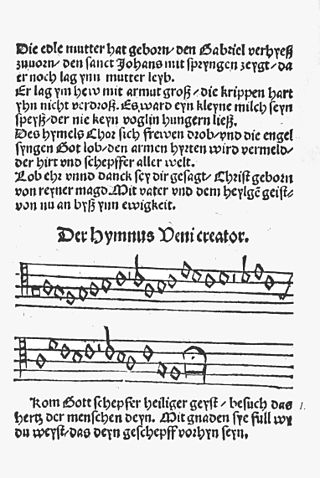
"Komm, Gott Schöpfer, Heiliger Geist" is a Lutheran hymn for Pentecost, with words written by Martin Luther based on the Latin "Veni Creator Spiritus". The hymn in seven stanzas was first published in 1524. Its hymn tunes are Zahn No. 294, derived from the chant of the Latin hymn, and Zahn No. 295, a later transformation of that melody. The number in the current Protestant hymnal Evangelisches Gesangbuch (EG) is 126.
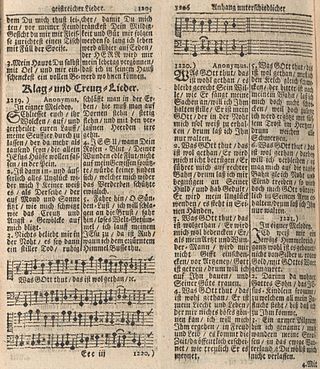
"Was Gott tut, das ist wohlgetan" is a Lutheran hymn written by the pietist German poet and schoolmaster Samuel Rodigast in 1675. The melody has been attributed to the cantor Severus Gastorius. An earlier hymn with the same title was written in the first half of the seventeenth century by the theologian Michael Altenburg.
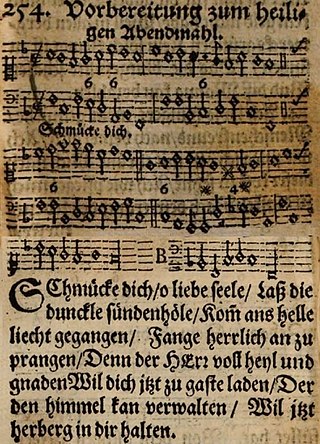
"Schmücke dich, o liebe Seele" is a Lutheran hymn in German, with lyrics by Johann Franck and a hymn tune by Johann Crüger. It was first published in Crüger's 1649 Geistliche Kirchen-Melodien, and was later adopted in other hymnals, such as the 1653 edition of his Praxis pietatis melica.

"Was mein Gott will, das g'scheh allzeit" is a Lutheran hymn in German. The text from c. 1550 is attributed to Albert, Duke of Prussia. The melody, Zahn No. 7568, goes back to a tune by Claudin de Sermisy, written in 1529 for a secular French song. The hymn has belonged to core Lutheran hymnody without interruption and is part of the Protestant hymnal Evangelisches Gesangbuch as EG 364.
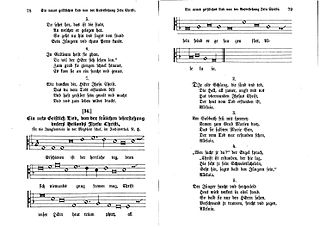
"Erschienen ist der herrlich Tag" is a German Easter hymn, with text and tune written by Nikolaus Herman and published in 1561. It has inspired musical settings by composers from the 17th to the 20th century. It appears in several hymnals, including the German Protestant hymnal Evangelisches Gesangbuch. Other hymns, especially Easter hymns, in both German and English, are sung to the same melody.

"Ach lieben Christen seid getrost" is a Lutheran hymn in German with lyrics by Johannes Gigas, written in 1561. A penitential hymn, it was the basis for Bach's chorale cantata Ach, lieben Christen, seid getrost, BWV 114.

"Nun danket all und bringet Ehr" is a German Lutheran hymn in nine stanzas, with a text written by Paul Gerhardt. It was first published in 1647, in Johann Crüger's Praxis pietatis melica which was the first publication of hymns by Gerhardt. In the 1653 edition, Crüger added a melody that he composed. As a general song of thanks, the song has appeared in several hymnals, including the German Protestant hymnal Evangelisches Gesangbuch and the Catholic hymnal Gotteslob. It has inspired musical settings by composers from the 17th to the 21st century. Johann Sebastian Bach used the first stanza in a cantata, however with the melody of "Lobt Gott, ihr Christen alle gleich", Hugo Distler composed a chorale cantata, and Günter Berger based a toccata for organ on it.
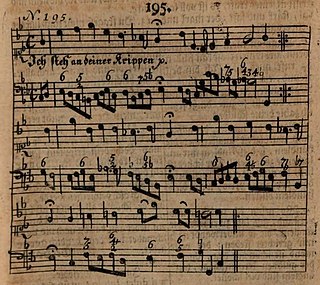
"Ich steh an deiner Krippen hier" is a German Christmas hymn, with lyrics by Paul Gerhardt which were first published in 1653. It was then sung with an older melody by Martin Luther, but a melody which was likely created by Johann Sebastian Bach for Schemellis Gesangbuch of 1736 is now part of current Protestant and Catholic hymnals.

"Mit Ernst, o Menschenkinder" is an Advent hymn by Valentin Thilo. It partly paraphrases the call to penitence by John the Baptist. The text was first published in 1642 in the collection Preußische Festlieder. The different melody that later became popular dates back to 1557.
"Lobpreiset all zu dieser Zeit" is a Christian hymn in German for a new year with text by Heinrich Bone written in 1851. It is contained in the Catholic hymnal Gotteslob. It is sung to a melody that Martin Luther created in 1529.




















